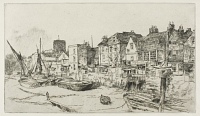Etchings Institutions search term: caxton club
The 'Adam and Eve', Old Chelsea | ||
| Number: | 182 | |
| Date: | 1878 | |
| Medium: | etching and drypoint | |
| Size: | 175 x 302 mm | |
| Signed: | butterfly at upper left (3) | |
| Inscribed: | no | |
| Set/Publication: | Hogarth and Son, 1879. | |
| No. of States: | 3 | |
| Known impressions: | 92 | |
| Catalogues: | K.175; M.172; W.144 | |
| Impressions taken from this plate (92) | ||
PUBLICATION
20: Wedmore 1886 A (cat. no. 144).
21: 14 March 1879, GUW #01098.
EXHIBITIONS
An impression shown in Leeds in 1893 was bought by the City Art Gallery and shown again in the following year (
 ). 24 Impressions were included and for sale in shows at H. Wunderlich & Co. in New York in 1898 and 1903, at Obach & Co. in London, also in 1903, and at F. Keppel & Co. in New York in 1904. Charles Lang Freer (1856-1919) lent an impression to the exhibition organised by the Caxton Club in Chicago in 1900 (either
). 24 Impressions were included and for sale in shows at H. Wunderlich & Co. in New York in 1898 and 1903, at Obach & Co. in London, also in 1903, and at F. Keppel & Co. in New York in 1904. Charles Lang Freer (1856-1919) lent an impression to the exhibition organised by the Caxton Club in Chicago in 1900 (either  or
or  ). 25
). 25
22: London Grosvenor 1879 (cat. no. 286); see REFERENCES: EXHIBITIONS.
23: New York 1881 (cat. no. 154).
24: Leeds 1894 (cat. no. 852).
25: Chicago 1900 (cat. no. 126).
 ), and, from the Royal Collection at Windsor, in London in 1905 . 26
), and, from the Royal Collection at Windsor, in London in 1905 . 26
26: New York 1904a (cat. no. 145); Boston 1904 (cat. no. 110); London Mem. 1905 (cat. no. 144).
SALES & COLLECTORS
Charles Lang Freer (1856-1919) bought a rather worn impression of the third state from F. Keppel & Co. in 1893, which he mistakenly thought was a first state (
 ). He then bought an earlier impression - a second state, with fresh drypoint burr - in 1899 from the same print dealer (
). He then bought an earlier impression - a second state, with fresh drypoint burr - in 1899 from the same print dealer ( ).
). ).
).27: Sotheby’s, 3 March 1892 (lot 228).
By various means - purchases, gifts and bequests - impressions went to collections all over the world. The British Museum acquired an impression that was printed with slight retroussage, in 1891 (
 ). A good clear impression of the third state (though with fading drypoint) was sold by the artist to William Cleverly Alexander (1840-1916), and was sold by the family to the British Museum a century later, in 1973 (
). A good clear impression of the third state (though with fading drypoint) was sold by the artist to William Cleverly Alexander (1840-1916), and was sold by the family to the British Museum a century later, in 1973 ( ).
). Sadly, the print acquired by the Staatliche Graphische Sammlung, Munich, in 1896 was destroyed by fire in 1944 (
 ). However, an impression was sold by Amsler & Ruthardt, Berlin, on 2 April 1901 to the Kupferstichkabinett Berlin for 121.25 M (
). However, an impression was sold by Amsler & Ruthardt, Berlin, on 2 April 1901 to the Kupferstichkabinett Berlin for 121.25 M ( ). Woldemar von Seidlitz (1850-1922) gave one to the the Kupferstich-Kabinett Dresden in 1919 (
). Woldemar von Seidlitz (1850-1922) gave one to the the Kupferstich-Kabinett Dresden in 1919 ( ).
).Early collectors in Britain included James Guthrie Orchar (1825-1888) (
 ); Henry Francis Herbert Thompson (1859-1944) (
); Henry Francis Herbert Thompson (1859-1944) ( ) and Guy John Fenton Knowles (1879-1959) (
) and Guy John Fenton Knowles (1879-1959) ( ). An impression shown in Leeds in 1893 was bought by the City Art Gallery (
). An impression shown in Leeds in 1893 was bought by the City Art Gallery ( ). The Trustees presented one to Birmingham Museum and Art Gallery in 1904 (
). The Trustees presented one to Birmingham Museum and Art Gallery in 1904 ( ). In France, Keppel & Co. possibly sold an impression to the Cabinet des estampes, Bibliothèque nationale de France in 1903 (
). In France, Keppel & Co. possibly sold an impression to the Cabinet des estampes, Bibliothèque nationale de France in 1903 ( ).
). Collectors in America included Samuel Putnam Avery (1822-1904) (
 ); George Aloysius Lucas (1824-1909) (
); George Aloysius Lucas (1824-1909) ( ); Bryan Lathrop (1844-1916) (
); Bryan Lathrop (1844-1916) ( ) and Harry Brisbane Dick (1855-1916) (
) and Harry Brisbane Dick (1855-1916) ( ). The impression owned by Howard Mansfield (1849-1938) passed to Harris G. Whittemore (d. ca 1937), and later came as part of the collection of Gardiner Greene Hubbard (1822-1897) to the Library of Congress (
). The impression owned by Howard Mansfield (1849-1938) passed to Harris G. Whittemore (d. ca 1937), and later came as part of the collection of Gardiner Greene Hubbard (1822-1897) to the Library of Congress ( ). Frederick Keppel (1845-1912) gave an impression to the Whistler House Museum in Lowell, MA (
). Frederick Keppel (1845-1912) gave an impression to the Whistler House Museum in Lowell, MA ( ) and bequeathed one to Boston Museum of Fine Arts (
) and bequeathed one to Boston Museum of Fine Arts ( ) and Albert Henry Wiggin (1868-1951) gave one to Boston Public Library (
) and Albert Henry Wiggin (1868-1951) gave one to Boston Public Library ( ).
).28: Christie’s, 13-4 July 1897 (lot 313); Christie's, 8 March 1900 (lot 7).
